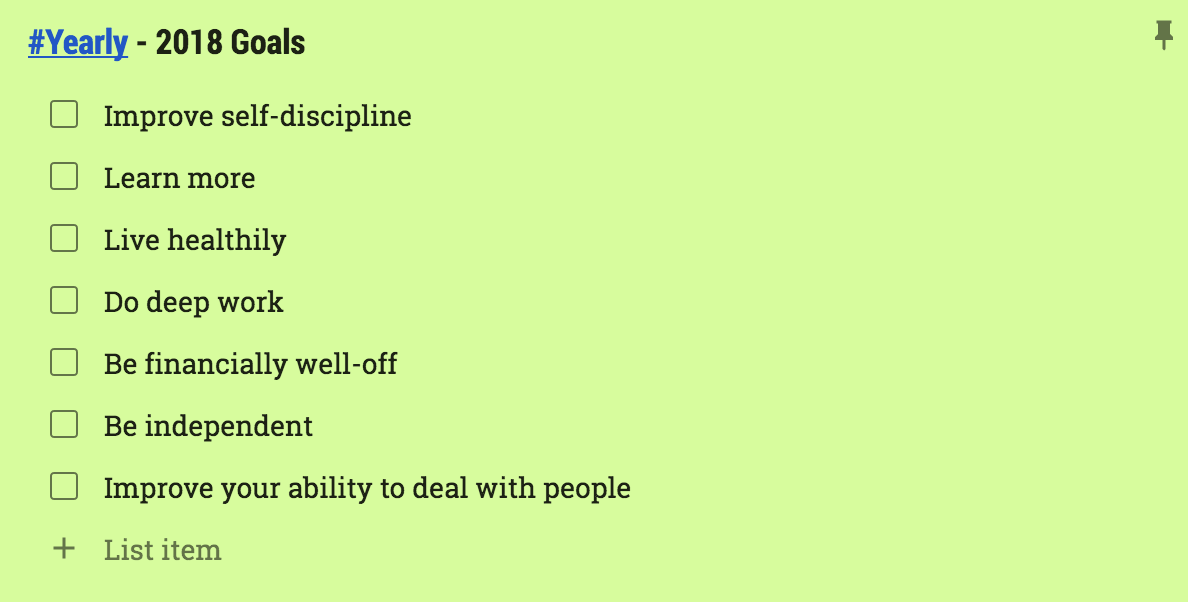Why self-reflect?
In the summer of 2015, I read Steve Jobs, a fantastic biography by Walter Issacson. I read the book during a time of my life when I was feeling lost and unsure, and learning about another person’s life taught me a lot about how I wanted to live my own. I was inspired by Jobs’ passion and I adopted the idea that one should live working hard on what he/she loved. My greatest fear, I realized, was feeling regret on my deathbed. The feeling of not living up to your potential, of simply coasting through life without any meaningful destination, of accomplishing little and impacting few was in my eyes, a tragedy.
After I finished Jobs’ biography, I set out on some soul-searching. I began noting down things that I wanted to accomplish in life. These goals ranged from big and vague to small and specific. For example, one of my goals was to “leave a footprint on the world” whereas another one was to intern at a big tech company, such as Google, Facebook, etc. Being fueled by hype, it was easy to maintain focus and work towards these goals for the first little while. Then, when the excitement wore off and the dust settled, I started getting thoughts that were all too familiar.1
“I’m going to do it tomorrow.”
“I’m tired/sleepy/hungry/etc.”
“Just one more League game…”
I came to the daunting realization that slowly but surely, each day would be met with waning desire to pursue my aspirations. In a blink of an eye, a year would have passed and I would be once again staring at an empty document trying to draft my goals, only for them to be orphaned soon after. Procrastination, self-indulgence, and straying away from the intended path are major precursors to disappointment and unfulfillment, and why success is so difficult to achieve.
Jobs practiced a simple but effective self-reflection habit in order keep him heading in the right direction. In this own words:
“If today were the last day of my life, would I want to do what I am about to do today? If the Answer is ‘no’ for too many days in a row, I know I need to change something.”
A conscious, persistent, relatively low-effort self-reflection habit is tantamount in preventing the erosion of our aspirations. It gives us a periodic reminder of our ambitions, enables us to track our progress and ultimately improves our velocity.
The effectiveness of self-reflection depends on how it’s implemented. I believe that self-reflection is most effective when there is a set of clear objectives underpinning it. Large goals should be broken down into varying granularities suitable for a given time period. This enables us to evaluate our actions against a rubric at particular time intervals. Furthermore, personal weaknesses or sources of malcontent should be identified so that actionable next steps can be taken to remedy the problem. For example, if I notice that my failure rate for technical interviews is less than reasonable, then perhaps I can improve by doing 1-2 Leetcode questions before I sleep every night.
By practicing self-reflection, it becomes easier to maintain focus on our dreams, hopefully leading to a greater sense of accomplishment of fufillment later in life.
How I do self-reflection
At the start of every year, I draft a list of macro goals that I want to achieve. These objectives are usually general and overarching, such as “live healthily”. I break these objectives into smaller, actionable, quantifiable items for each month, such as “go rock climbing 8 times in January”. For each day, I create a list of micro tasks. These tasks have binary outcomes, for e.g. “go rock climbing for an hour at 7 PM”. At the end of every day, month, and year I would look back on my goals and reflect on my progress, strengths, weaknesses, and next steps for improvement.

I dedicate 5 minutes every morning to review my tasks for the day and 20 minutes every night to reflect and make plans for tomorrow. I try to keep my reflections concise so that the amount of effort required is low and it becomes easier to habituate.
I’ve been practicing self-reflection for a year or so, albeit my commitment to it waxes and wanes from week to week. Conveniently, this situation sets up an A/B test which reveals that I self-indulge less, manage my todo list better, and get more work done when I actively self-reflect. Looking back, it’s clear that practicing self-reflection has helped stabilize my life and made it easier than ever for me to work towards my goals.
Footnotes
- Self-indulgence isn’t a fundamental evil. It’s depends on both extent and timing. It can promote relaxation and relive stress after a long day of work or it can be addictive, taking attention away from important responsibilities.

